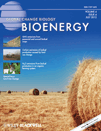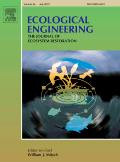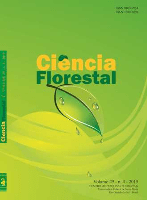
Global Change Biology Bioenergy
Scope & Guideline
Advancing Sustainable Solutions for Global Change
Introduction
Aims and Scopes
- Sustainable Bioenergy Production:
The journal emphasizes research on sustainable practices in bioenergy production, including the use of various biomass sources such as miscanthus, switchgrass, and other perennial crops. It explores methods to enhance biomass yield while minimizing environmental impacts. - Carbon Cycling and Sequestration:
A core area of focus is the role of bioenergy crops in carbon cycling and sequestration. Studies often investigate the carbon storage potential of different land-use practices and how bioenergy crops can contribute to climate change mitigation. - Technological Innovations in Bioenergy:
The journal covers advancements in biotechnology and engineering related to bioenergy. This includes genetic modifications, nanotechnology applications, and novel bioconversion processes to improve the efficiency of biofuel production. - Environmental Impacts and Ecosystem Services:
Research in this journal frequently assesses the environmental consequences of bioenergy practices, including impacts on soil health, water resources, and biodiversity, thereby linking bioenergy to broader ecological considerations. - Policy and Economic Aspects of Bioenergy:
The journal also addresses the socio-economic implications of bioenergy production, including market dynamics, policy frameworks, and the economic viability of transitioning to bioenergy systems.
Trending and Emerging
- Climate Change Mitigation Strategies:
Increasingly, studies are focusing on the potential of bioenergy crops to serve as viable strategies for climate change mitigation, including carbon capture and storage (CCS) and the role of biofuels in reducing greenhouse gas emissions. - Biomass Utilization from Marginal Lands:
There is a growing trend toward researching the utilization of marginal lands for bioenergy production. This includes assessing the ecological and economic viability of cultivating energy crops on previously underused or degraded lands. - Integrative Approaches to Bioenergy Systems:
Research is trending towards integrative approaches that consider the interactions between bioenergy systems and broader ecological and social systems. This includes studies on biodiversity, soil health, and ecosystem services. - Innovative Bioprocessing Technologies:
Emerging technologies in bioenergy production, such as microbial fuel cells, advanced bioconversion techniques, and genetic engineering of bioenergy crops, are gaining attention for their potential to enhance efficiency and sustainability. - Life Cycle Assessments (LCA) and Sustainability Metrics:
There is an increasing emphasis on comprehensive life cycle assessments to evaluate the sustainability of bioenergy systems, including their environmental, economic, and social impacts.
Declining or Waning
- Traditional Biofuel Feedstocks:
Research on conventional biofuel feedstocks like corn and soy has decreased as the focus shifts toward more sustainable and diverse biomass sources, such as perennial grasses and agricultural residues. - Single-Factor Analyses:
There is a waning interest in studies that examine bioenergy systems in isolation without considering multi-factor interactions. The trend is moving towards more integrative approaches that encompass ecological, economic, and social dimensions. - Static Yield Predictions:
The focus on static yield predictions for bioenergy crops has declined. Recent research emphasizes dynamic modeling that incorporates environmental variability and adaptive management strategies. - Short-Term Economic Assessments:
There has been a reduction in simple economic assessments of bioenergy systems that do not account for long-term sustainability and ecological impacts, as researchers increasingly prioritize comprehensive life-cycle analyses.
Similar Journals

Boletin del grupo espanol del carbon
Pioneering Research in Carbon Applications and SustainabilityBoletin del Grupo Español del Carbon, a pivotal journal in the field of carbon science, is published by the Grupo Español Carbon and serves as a significant platform for disseminating research related to carbon materials, their applications, and advancements in carbon technology. With an ISSN of 2172-6094, this journal aims to bridge the gap between academia and industry by featuring original research articles, reviews, and noteworthy contributions from specialists in the sector. Though currently not designated as Open Access, the journal's commitment to quality ensures that the articles are available through various academic databases, enhancing accessibility for researchers, professionals, and students alike. Located in Zaragoza, Spain, at the prestigious Instituto Carboquímica, the journal endorses rigorous peer review and strives to foster international collaboration within the carbon research community. By maintaining high academic standards, Boletin del Grupo Español del Carbon aspires to impact the fields of materials science and environmental sustainability significantly.

ECOLOGICAL ENGINEERING
Transforming ecological challenges into actionable solutions.ECOLOGICAL ENGINEERING, published by Elsevier in the Netherlands, is a leading journal dedicated to advancing the field of environmental engineering and sustainable development. With an impressive impact factor and recognized as Q1 in multiple categories including Environmental Engineering, Management, Monitoring, Policy and Law, as well as Nature and Landscape Conservation, this journal stands at the forefront of environmental science research. It ranks among the top publications in its fields according to Scopus, reinforcing its significance with a notable position within the 90th percentile for Nature and Landscape Conservation. ECOLOGICAL ENGINEERING encourages open discourse and dissemination of innovative practices aimed at addressing contemporary ecological challenges, making it an essential resource for researchers, professionals, and students committed to sustainable practices and environmental stewardship. The journal’s comprehensive scope includes ecological restoration, habitat management, and policy implementation, ensuring a broad spectrum of relevant topics for its readership.

CIENCIA FLORESTAL
Fostering Collaboration in Forestry ResearchCIENCIA FLORESTAL is a premier open-access journal published by the Universidade Federal de Santa Maria, dedicated to advancing knowledge in the field of Forestry. Established in 1991, it provides a vital platform for researchers, professionals, and students to disseminate innovative research findings and methodologies. With an ISSN of 0103-9954 and an E-ISSN of 1980-5098, this journal offers extensive access options for a global audience, ensuring that key scientific discoveries in forest science are available to all. The journal is recognized for its contribution to the scholarly community, currently ranked in the Q3 category within the Forestry discipline, reflecting its commitment to quality and relevance in research. CIENCIA FLORESTAL covers a wide array of topics related to forestry practices, environmental sustainability, and biological sciences, making it an essential resource for those seeking to deepen their understanding of forest ecosystems and their management. Whether you’re a seasoned researcher or a student embarking on your academic journey, CIENCIA FLORESTAL stands as an invaluable asset in the exploration and development of forestry sciences in Brazil and beyond.

GLOBAL BIOGEOCHEMICAL CYCLES
Leading the charge in interdisciplinary environmental research.GLOBAL BIOGEOCHEMICAL CYCLES, published by the American Geophysical Union, is a leading journal in the field of geochemistry that has gained significant recognition since its inception in 1987. With an impressive impact factor and a Q1 ranking in multiple categories such as Atmospheric Science, Environmental Chemistry, and Global and Planetary Change, it serves as a crucial platform for the dissemination of high-quality research. This journal emphasizes interdisciplinary studies focusing on biogeochemical processes and their implications for global environmental change, attracting contributions from a diverse range of scientific communities. Researchers, professionals, and students engaged in atmospheric sciences, environmental chemistry, and planetary sciences will find invaluable insights and state-of-the-art methodologies within its pages. GLOBAL BIOGEOCHEMICAL CYCLES continues to advance our understanding of the Earth’s systems, thus holding a pivotal position in shaping future environmental policies and sustainability efforts.

GLOBAL CHANGE BIOLOGY
Exploring the Interconnections of Life and ClimateGLOBAL CHANGE BIOLOGY, published by Wiley, is a leading journal dedicated to advancing the scientific understanding of the relationships between biological systems and global environmental changes. With an impressive impact factor placing it in the Q1 category across multiple disciplines—including Ecology, Environmental Chemistry, and Global and Planetary Change—this journal is essential for researchers, professionals, and students aiming to stay at the forefront of this dynamic field. The journal has a rich history since its inception in 1995, continually providing a platform for high-quality research that informs policy and management practices worldwide. Although it is not open access, the journal remains a valuable resource for those committed to exploring the complexities of ecological and environmental change. With a Scopus ranking of #3 in Global and Planetary Change and #6 in both Ecology and Environmental Chemistry, GLOBAL CHANGE BIOLOGY continues to shape the dialogue on the pressing environmental challenges of our time.

Renewable Energy
Innovating Tomorrow's Energy Solutions.Renewable Energy is a prestigious international journal published by PERGAMON-ELSEVIER SCIENCE LTD, dedicated to advancing the field of renewable energy technologies and their applications. Since its inception in 1991, this journal has provided a critical platform for researchers, professionals, and students to explore innovative solutions in renewable energy, sustainability, and environmental protection. With an impressive impact factor and ranked in the top quartile (Q1) of its category, Renewable Energy is recognized for its high-quality, peer-reviewed research that significantly contributes to the scientific and professional discourse in the sector. The journal is indexed in Scopus, holding an esteemed rank of #21 out of 270 in its field, underscoring its influence and reach. Researchers can access the journal’s articles through traditional subscriptions, ensuring a broad dissemination of vital knowledge that supports the global transition to sustainable energy sources. Addressed from its headquarters in Oxford, England, Renewable Energy is crucial for anyone involved in the journey towards a sustainable future, fostering collaboration and innovation in a critical area of environmental science.

Biogeosciences
Advancing knowledge in biogeosciences for a sustainable future.Biogeosciences, published by COPERNICUS GESELLSCHAFT MBH in Germany, is a prestigious open access journal that has been a leading platform for innovative research since its establishment in 2004. With an impressive impact reflected in its Q1 rankings within both the Earth-Surface Processes and Ecology, Evolution, Behavior and Systematics categories, it caters to a diverse readership encompassing researchers, professionals, and students engaged in the life sciences and earth sciences. The journal's commitment to disseminating high-quality research is evident from its exemplary Scopus rankings, highlighting its role in fostering advancements and discussions in biogeoscience. With full open access options, readers worldwide can freely explore significant findings that contribute to our understanding of ecological and geoscientific principles. As the journal converges into its next decade, it continues to be an essential resource for those seeking to bridge the disciplines of biology and earth sciences.

Green Energy & Environment
Advancing Knowledge in Renewable Energy and Environmental Science.Green Energy & Environment, published by KEAI PUBLISHING LTD, stands as a pioneering journal dedicated to the dynamic fields of renewable energy, sustainability, and environmental science. With its ISSN 2096-2797 and E-ISSN 2468-0257, this Q1 journal holds a noteworthy presence in academic discourse, reflecting its high-quality contributions within these critical areas of research. Launched in 2016, it has consistently embraced an Open Access model, facilitating unhindered access to research findings and fostering collaboration across global communities. Based in Beijing, China, this journal is dedicated to disseminating innovative insights that are essential for addressing urgent global challenges related to energy and environmental sustainability. Researchers, professionals, and students alike benefit from a platform that not only showcases pioneering research but also encourages interdisciplinary dialogue and knowledge exchange in the pursuit of a sustainable future.

AIMS Energy
Pioneering Research in Renewable Energy and BeyondAIMS Energy is a leading academic journal published by the American Institute of Mathematical Sciences (AIMS), dedicated to advancing the field of energy research. With a strong commitment to Open Access since its inception in 2013, this journal offers a platform for researchers, professionals, and students to share innovative findings and enrich the discourse in crucial areas such as Energy Engineering and Power Technology, Fuel Technology, and Renewable Energy, Sustainability and the Environment. Recognized for its quality, AIMS Energy holds a respectable impact with a Q3 ranking in multiple categories as of 2023, and it ranks within the top half of its peers in the Scopus database. The journal's objective is to disseminate high-quality research that addresses contemporary challenges in energy and offers sustainable solutions. By fostering collaboration and discussion among various stakeholders, AIMS Energy plays a critical role in shaping the future of energy technologies and policies.

Scientia Forestalis
Innovating research to shape the future of forestry.Scientia Forestalis is a prominent academic journal dedicated to advancing the field of forestry and environmental studies. Established in 1996 and published by the Instituto de Pesquisa e Estudos Florestais (IPEF) in Brazil, this journal provides a critical platform for researchers and practitioners to disseminate innovative studies and findings in forestry. With an HIndex reflective of its academic impact and ranking in the third quartile of forestry journals, Scientia Forestalis is positioned to cater to a diverse audience, including scholars, professionals, and students engaged in agricultural and biological sciences. Despite its non-open access model, the journal maintains a commitment to high-quality research that fosters an understanding of forest ecosystems and sustainable practices. Published articles span a wide range of topics, ensuring that crucial developments in forestry science are captured and shared. The journal's current Scopus rank places it within the 26th percentile, affirming its role in shaping forestry research in a global context, making it an essential resource for anyone interested in this vital field.